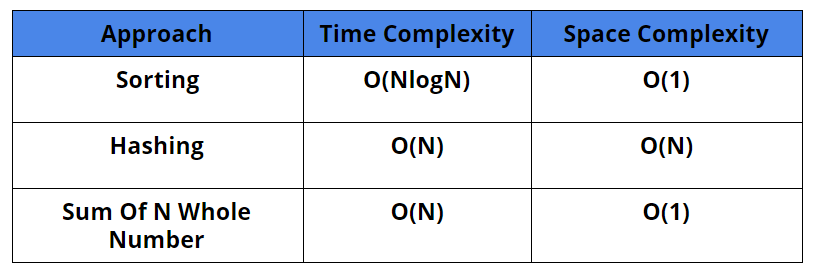Missing Number
AfterAcademy Tech
•
10 Aug 2020

Difficulty: Easy
Asked in: Amazon, Yahoo
Understanding The Problem
Problem Description
Given an array arr[] consists of 0, 1, 2, 3, 4,.....n. But one of the numbers is missing in it. Write a program to find the number that is missing from the array.
Problem Note: Your algorithm should run in linear runtime complexity. Could you implement it using only constant extra space complexity?
NOTE: All the elements in the array are distinct.
There will be only one missing number in the given array, two missing numbers will not be there. Also, if there is no missing number then you have to return the number that is coming just after the largest element of the array.
Example 1
Input: arr[] = [4,3,1,2]
Output: 0
Explanation: The array should have elements 0,1,2,3,4 but 0 is missing. So, the answer is 0.
Example 2
Input: arr[] = [4,5,0,6,1,7,3]
Output: 2
Explanation: All the numbers except 2 are present in the given array consisting of 0,1,2..7
Example 3
Input: arr[] = [4,3,1,0,2]
Output: 5
Explanation: All distinct elements 0,1,2,3,4,5 should be present in the array but 5 is missing. So, the answer is 5.
Solutions
We will be discussing three solutions for the problem
- Sorting: Sort the array and compare each index with the value at that index, if it's not equal then return the index
- Hashing: Store the values of the array in a hashmap and iterate over the range from 0 to n.
- Sum of n whole numbers: Find the sum of n numbers and the sum of the array and return the difference between them.
You may try this problem here now.
1. Sorting
To find the missing number in the range of size of the array, we can easily sort the array knowing that the values in the array are in the range of size of the array and they are not duplicate.
So, If we sort the array, then we can conclude that the first number not matching with its index value is our missing number.
Solution Steps
- Sort the input array
- iterate over the array until
arr[idx] == idxotherwise, returnidxas the answer.
Pseudo Code
int getMissingNumber(int[] arr) {
arr.sort()
size = arr.length
for(i = 0 to i < size){
if(arr[i] != i){
return i
}
}
return i+1
}
Complexity Analysis
Time Complexity: O(NlogN)
Space Complexity: O(1)
Critical Ideas to Think
- Why are we comparing
arr[i]withi? - Why did we return
i+1in the end? - Can you optimize the time complexity?
2. Hashing
We can create a set or hashmap to store each value inside it knowing that search operation inside a set or hashmap is O(1). Now if we iterate over the range from 0 to the size of the array, then we can look for each value whether or not they are present inside the set. The first number not found in the set will be our answer.
Solution Steps
- Create a hashmap and store all the value inside it
- Now iterate over the range from 0 to size of the array
- Return the first element not present inside the set or hashmap.
Pseudo Code
int getMissingNumber(int[] arr) {
size = arr.length
set = Set()
for(i = 0 to i < size) {
set.add(arr[i])
}
for(i = 0 to i <= size) {
if(i not in set){
return i
}
}
}
Complexity Analysis
Time Complexity: O(n)
Space Complexity: O(n)
Critical Ideas to Think
- Why did we iterate till
i<=sizein the second for loop? - Give reasons why will this approach work!
- Can you optimize the space complexity?
3. Sum of N Whole Numbers
We know that the missing number is in the range from 0 to N (including 0 and N). Let p be a number missing in the sum of range from 0 to N, then the total sum would be sigma(0 to N)-p . Where sigma(0 to N) is N*(N+1)/2 .
So, we can deduce that the difference of the sum of N whole numbers and the sum of the array will be the missing number.
Consider example 2,
arr_sum = 4+5+0+6+1+7+3 =26
expected_sum = 7*8/2 = 7*4 = 28
So, missing number = 28-26 = 2
Solution Steps
- Store the sum of the array in
arr_sum - Store the sum of N whole numbers in
exp_sumwhere N is the length of the array. - Return the difference between
exp_sumandarr_sum.
Pseudo Code
int getMissingNumber(int[] arr) {
size = arr.length
arr_sum = 0
for(i = 0 to i < size) {
arr_sum = arr_sum + arr[i]
}
exp_sum = size * (size+1) / 2
return exp_sum - arr_sum
}
Complexity Analysis
Time Complexity: O(n)
Space Complexity: O(1)
Critical Ideas To Think
- What is the formula of the sum of N natural numbers?
- Why did this approach work?
Comparison Of Different Approaches

Suggested Problems To Solve
- Missing Positive Number
- Smallest Prime number missing in the array
- Find the missing number in Geometric Progression
- Find the Missing Number in a sorted array
- Find the only missing number in a sorted array
- Find the missing number in Arithmetic Progression
- Find the missing number in another array which is shuffled copy
May the code be with You!
Enjoy Algorithms!
Written by AfterAcademy Tech
Share this article and spread the knowledge
Read Similar Articles
AfterAcademy Tech
Minimum Number Of Jumps To Reach End
Given an array of non-negative integers arr[] of length n, where each element represents the max number of steps that can be made forward from that element. You are initially positioned at the first index of the array. Write a program to return the minimum number of jumps to reach the last index of the array.

AfterAcademy Tech
Maximum Product Of Three Numbers
write a program to find three numbers whose product is maximum and output the maximum product. This is a basic mathematical problem and requires logical skill to solve.

AfterAcademy Tech
Letter Combinations of a Phone Number
Given a string str, containing digits from 2 - 9 inclusive, write a program to return all the possible letter combinations that the number could represent. This is a popular coding interview question based on backtracking and recursive approach.

AfterAcademy Tech
Find Missing Positive - Interview Problem
Given an array, find the smallest missing positive integer.
